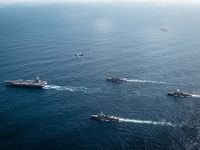Arab industrialists and businessmen will gather in Fez this week to debate the feasibility of an Arab free trade area.
“The achievement of inter-Arab economic cooperation and the creation of a free trade area is a paramount need for Arabs to survive in the new world economic environment, marked by rampant globalization,” Mr. Abdellah Zouhir, President of the Arab Union of Trade, Industry and Agriculture Chambers Federation (AUTIACF) told the Moroccan news Agency MAP.
Economic operators in the 21 Arab nations have been striving for a free trade area to exploit their countries’ various and complementing economies. However, the project is still a dream that stumbles over political differences among the nations with a market of more than 170 million consumers.
According to Mr. Zouhir, Arabs have grown aware of the need to join their efforts to face up the challenges of globalization and of the proliferation of powerful regional groupings.
“The creation of regional groupings is not a mere fashion. It is rather an imperative,” he said. The Arab region has two regional groupings - The Arab Gulf Cooperation Council (GCC) comprising Saudi Arabia, Kuwait, The United Arab Emirates, Bahrain, Qatar and Oman, and the Arab Maghreb Union (UMA) with Morocco, Algeria, Tunisia, Libya and Mauritania.
While the GCC has had relative success in coordinating efforts among its six member states, UMA, which was set up in 1989, is paralyzed by political differences, especially between Morocco and Algeria. The two nations are at loggerheads over the issue of Western Sahara, a mineral-rich desert controlled by Morocco.
Algerian supports the independence of the territory. Although there are no official figures on the volume of trade among Arab nations, observers it is very low compared to these countries' exchanges with other countries in the World. Besides its strategic location on the globe, Arab lands stretches from the Atlantic Ocean to the Persian Gulf, offering all ingredients of a powerful grouping.
Arab countries have the largest oil reserves in the world and fertile lands in Sudan, Iraq and Morocco can ensure the region’s self-sufficiency in food. Mr. Zouhir underlined that Arabs should progress quickly towards the creation of a free trade zone, as time is running against their interests.
The Fez meeting, to be attended by more than 150 Arab investors, will see partnership and joint investments project proposals as a step toward a free trade area. — (Albawaba-MEBG)
© 2000 Mena Report (www.menareport.com)







